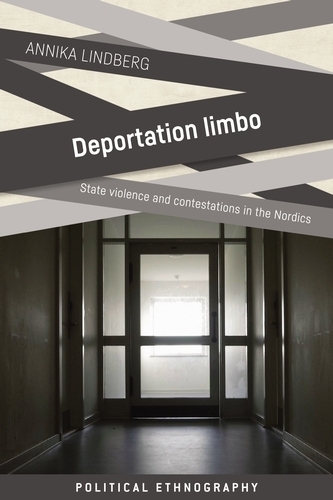
Deportation Limbo: State Violence and Contestations in the Nordics
(Hardback)
Publishing Details
Deportation Limbo: State Violence and Contestations in the Nordics
By (Author) Annika Lindberg
Manchester University Press
Manchester University Press
1st February 2023
United Kingdom
Classifications
Tertiary Education
Non Fiction
Migration, immigration and emigration
Politics and government
325.109485
Physical Properties
Hardback
208
Width 156mm, Height 234mm, Spine 13mm
467g
Description
Deportation limbo offers a political ethnography of deportation enforcement in Denmark and Sweden. It takes place in a time when deportation has emerged as a key priority in Northern European states migration policy regimes, and when states are stepping up their efforts to address the so-called deportation gap. The book takes the reader inside detention centres, deportation camps and migration offices, and explores how frontline officials deal with their task of pressuring non-deported migrants to leave, and the injurious effects of these efforts. Using the analytical frame of a continuum of state violence, the book details the tension-ridden enforcement of policy measures which, rather than enhancing deportations, render non-deported people stuck in precarious limbo. It brings up questions of the violence endemic to border regimes, and about racism, and bureaucratic exclusion in the Nordic welfare states.
Reviews
Annika Lindberg has provided an essential piece of scholarship that analyses Nordic migration regimes. For people who have experienced European migration and asylum regimes, and scholars who research semi-carceral systems of border regulation, Lindbergs theorisation of a Deportation limbo is compelling and convincing in equal measure. Moreover, it is underpinned by exhaustive ethnographic research with people on the sharp end of Nordic immigration control. Their stories and testimonies are written up with compassion and grace. The book is indispensable reading for scholars of migration and asylum but also for those seeking to understand how racism works its way through contemporary European states, constructing the lives of migrant others as exploitable, disposable and deportable.
Arshad Isakjee, Senior Lecturer in Human Geography, University of Liverpool
In a world where borders are increasingly becoming sites of violence and death as well as of resistance and contestation, Deportation limbo provides a thorough analysis and a powerful critique of the daily operation of states mobility control regimes. Taking us on a journey through the landscapes of the Swedish and Danish detention and deportation systems, Lindbergs book unveils deportation as a form of state violence, which suspends peoples lives and traps them in indefinite, deadly, limbo. This violence, which stems from fantasies of controlling human mobility, is being normalised and concealed, as Lindberg brilliantly demonstrates, making visible the racist infrastructures of nation states projects and the political prioritisation of some lives over others. Lindbergs compelling book is ultimately a call for us all: to bear witness to state sanctioned border violence and to envision alternative futures that can allow us to be in the world together. This is essential and timely reading for anyone interested in a complex understanding of state violence and border regimes, and their multiple, devastating effects on us all.
Francesca Esposito, Lecturer in the School of Social Sciences, University of Westminster and Associate Director for Community Engagement and Activism at Border Criminologies, University of Oxford
Author Bio
Annika Lindberg is a Postdoctoral Researcher at the School of Global Studies, University of Gothenburg
